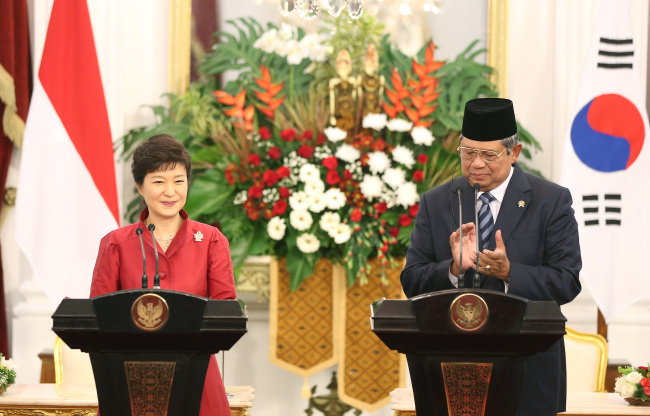한국과 인도네시아가 통화스와프를 맺는다.
12일(현지시간) 기획재정부·한국은행은 한국과 인도네시아 양국 재무장관과 중앙은행 총재가 미국 워싱턴DC에서 만나 최대 미화 100억달러 규모의 양자 통화스와프를 체결하기로 합의했다고 밝혔다.
이번 스와프는 한국 원화와 인도네시아 루피아화를 교환하는 방식이다. 한화로 10조7천억원(115조 루피아화) 규모다. 만기는 3년으로 양측 합의하에 연장이 가능하다.
기재부·한은은 "이번 통화스와프는 양국간 무역을 촉진하고 금융협력을 강화하는 등 양국의 상호 이익을 증진시키기 위한 것"이라고 설명했다.
특히 양국은 이 통화스와프를 양국간 무역에 결제용도로 사용하기로 합의했다.
이렇게 되면 양국 교역에서 미 달러화에 대한 의존도가 낮아지는 효과는 물론 원화의 국제화를 돕는 측면도 있다.
인도네시아는 한국과의 교역량이 지난해 약 300억불로 8번째로 가장 큰 무역국가다. 한국의 투자도 지난해 10억 달러로 동남아시아국가연합(ASEAN) 중 가장 많다.
기재부·한은은 "앞으로 상호간 이익이 되는 국가들과의 양자 통화스와프를 확대할 계획"이라며 "교역규모, 부존자원, 성장잠재력 등을 종합적으로 고려해 선별적으로 추진하겠다"고 전했다.
<관련 영문 기사>
Korea, Indonesia aim to clinch FTA within yearBy Song Sang-ho
Korea Herald correspondent
JAKARTA -– The leaders of South Korea and Indonesia on Saturday agreed to conclude free trade negotiations within the year reaffirming the goal of more than tripling bilateral trade by 2020.
After their summit in Jakarta Presidents Park Geun-hye and Susilo Bambang Yudhoyono announced that the two countries would aim to sign a comprehensive economic partnership agreement, or CEPA, before the end of the year to cut tariffs and promote industrial and investment cooperation.
Separately, finance ministers from the two countries agreed in Washington on Saturday to sign a currency swap deal worth $10 billion amid growing concerns about possible U.S. monetary tapering.
The agreement would be effective for three years and could be extended, the Finance Ministry said.
“Sharing the view that the CEPA would help the two countries achieve our trade goal, and institutionalize bilateral economic cooperation, our leaders agreed to conclude the negotiations by the end of this year,” Park said during a joint press conference with Yudhoyono.
Park was referring to the goal of increasing bilateral trade volume from last year’s $30 billion to $50 billion by 2015 and $100 billion by 2020.
The summit capped her eight-day tour of Indonesia and Brunei to attend regional forums and cement ties with geostrategically crucial, resource-rich Southeast Asian nations.
A CEPA has a wider scope of cooperation than a free trade agreement. It stipulates not only the level of market opening, but also bilateral industrial cooperation and investment.
Through the envisioned deal with Indonesia, South Korea expects a higher level of trade liberalization than what its FTA with the 10-member Association of Southeast Asian Nations mandates.
South Korean makers of automobiles, petrochemical products, ships and steel would largely benefit from lower tariffs.
Indonesia is expected to see more investment and technological cooperation from South Korea.
The two countries started CEPA negotiations since July last year but made little progress until recently.
Seoul was thought to be likely to gain more trade benefits from the deal than Jakarta, whose main exports are mostly mineral resources. During the negotiations, Jakarta was said to have focused on enhancing investment and industrial cooperation with Seoul.
With the world’s fourth-largest population of nearly 250 million, Indonesia has emerged as one of the most promising markets in the ASEAN region.
The country -- the only ASEAN member of the Group of 20 -- is South Korea’s eighth-largest trading partner and second largest gas supplier and eighth largest oil provider.
Their trade volume has increased 150-fold to $30 billion last year from $200 million in 1973 when they established diplomatic relations. Annual people-to-people exchanges also rose during the period to 450,000 last year, from 3,000 40 years earlier.
In 2006, they established a strategic partnership to expand the scope and depth of their relationship.
After the summit, the two countries signed four agreements on cooperation in developing special economic zones, forest recreation and ecotourism and the creative content industry, and expanding financial support for Indonesia’s development projects.
The agreement on ecotourism aims to deepen and widen their forest development cooperation, which has so far been centered on developing wood resources and biomass energy.
The two sides also agreed to deepen their cooperation in the defense industry. South Korea has so far inked two major contracts -- worth $1.4 billion in total -- to sell 16 T-50 trainer jets and three submarines to Indonesia.
The previous day, South Korean firms signed a series of agreements on issues including technology sharing in energy and natural resources; power plant construction; joint exploration and development of resources; and establishing energy-related infrastructure.
During the summit, Park also asked the Indonesian leader to support South Korean firms’ participation in the country’s major infrastructure projects such as constructing the Sunda Straits Bridge, Karian Dam and Soekarno-Hatta International Airport.
Park arrived in Jakarta on Thursday night for a three-day state visit after attending the Asia-Pacific Economic Cooperation summit in Bali and several forums with 10 Southeast Asian nations and other regional partners in Bandar Seri Begawan, Brunei.
Indonesia is the destination for Park’s fourth overseas trip after the U.S., China and Vietnam.
(
sshluck@heraldcorp.com)





![[Herald Interview] 'Trump will use tariffs as first line of defense for American manufacturing'](http://res.heraldm.com/phpwas/restmb_idxmake.php?idx=644&simg=/content/image/2024/11/26/20241126050017_0.jpg)


![[Herald Review] 'Gangnam B-Side' combines social realism with masterful suspense, performance](http://res.heraldm.com/phpwas/restmb_idxmake.php?idx=644&simg=/content/image/2024/11/25/20241125050072_0.jpg)